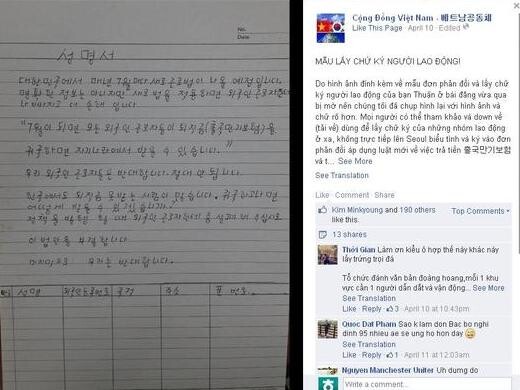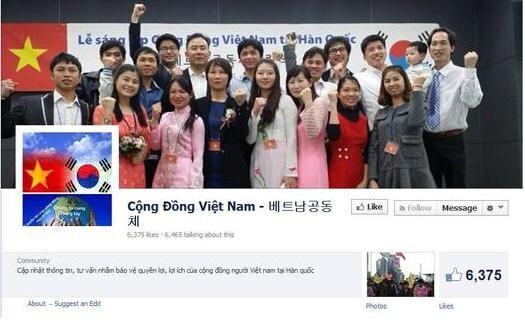hankyoreh
Links to other country sites 다른 나라 사이트 링크
Getting severance will be tougher for foreign migrant workers

By Kim Min-kyung, staff reporter
Van Thanh posted a photo of his handwritten statement on Apr. 21 to a community Facebook page for Vietnamese people living in South Korea. The 26-year-old migrant worker from Vietnam, who lives in Changwon, South Gyeongsang Province, wrote, “After July, all foreign workers can only receive severance pay (departure guarantee insurance) from their own country after they’ve returned home. How are we supposed to get it at home when there are so many people who can’t even get it here in South Korea?”
In 2003, the National Assembly responded to a problem of foreign workers not receiving severance pay by enacting the Act on the Employment Etc. of Foreign Workers. The legislation required employers to enroll in departure guarantee insurance in lieu of severance pay.
But an amendment made to the law on Dec. 31 of last year added a new clause stating that this insurance would only be paid “within 14 days after the departure date.” The amendment was sponsored by Saenuri Party (NFP) lawmaker Kim Sung-tae and others to prevent workers from staying in South Korea illegally. Once the amended law goes into effect on July 29, workers will only be able to receive severance pay after returning home.
To date, workers have been able to receive the payout within three days of leaving their job, regardless of whether they exit the country. Even workers who changed companies midway through their stay were able to receive full severance pay from previous employers after they returned home.
Now groups working for migrant worker rights are upset about the belated news of the amendment. Many are worried workers will be unable to receive all the money they are owed.
“A lot of people can’t even get their severance pay when they stay in South Korea,” said Van Thanh. “That’s only going to become more difficult once we’re back in Vietnam.”
“You need to look at the facts of what migrant workers face when you’re making policy,” he added.
Another sore issue, however minor the amounts involved, has to do with the transaction fees incurred when making wire transfers. Also, the departure guarantee insurance only covers basic pay, without consideration for overtime or nighttime work. Workers are in for more of a hassle making requests in cases where there are discrepancies between their actual severance pay and insurance costs.
“All they would need to do is request the difference between the actual severance pay and the insurance during their stay, before they leave,” a Ministry of Employment and Labor official said on condition of anonymity on Apr. 13.
But while the ministry is suggesting the problem is not serious, others are expressing more concern.
“Even now, 36% of foreign workers don’t even know if they’re enrolled in departure guarantee insurance, let alone how to request the difference from actual severance pay,” said Jung Young-sup, secretary-general of the Migrant Worker Campaign Support Association. “If they can only receive it after they’ve gone home, then we can expect to see more and more workers being hurt by this.”
Figures released in Aug. 2010 by Hong Hee-deok, a former lawmaker for the Democratic Labor Party, showed 23.7 billion won (US$22.9 million) in unpaid departure guarantee insurance between 2008 and 2010, amounting to 12% of the total. More recently, the Ministry of Employment and Labor released figured in Sept. 2013 showing unclaimed insurance payouts of 17.5 billion won (US$16.9 million). 11% of foreign workers were found to be not enrolled in the system.
The main problem, observers said, is the fact that the law was amended to delay payment simply because of concerns about migrants staying in the country illegally.
“Severance pay is a basic right that workers are entitled to when they leave their job, and it’s also a property right,” said Yun Ji-yeong, an attorney with the GongGam Human Rights Law Foundation. “To apply different conditions to foreign workers is to discriminate between them and domestic workers.”
These concerns were echoed in a legislative review report by the National Assembly Environment and Labor Committee last December.
“Not only does [the law] restrict payment rights in a way that the Labor Standards Act does not, but it is questionable whether it would actually reduce the number of people staying in the country illegally,” the report stated.
Migrant worker groups are currently planning to shortly file for an injunction against the law and lodge a constitutional appeal.

Please direct questions or comments to [english@hani.co.kr]

Editorial・opinion
![[Guest essay] The real reason Korea’s new right wants to dub Rhee a founding father [Guest essay] The real reason Korea’s new right wants to dub Rhee a founding father](https://flexible.img.hani.co.kr/flexible/normal/500/300/imgdb/original/2024/0423/8317138574257878.jpg) [Guest essay] The real reason Korea’s new right wants to dub Rhee a founding father
[Guest essay] The real reason Korea’s new right wants to dub Rhee a founding father![[Column] ‘Choson’: Is it time we start referring to N. Korea in its own terms? [Column] ‘Choson’: Is it time we start referring to N. Korea in its own terms?](https://flexible.img.hani.co.kr/flexible/normal/500/300/imgdb/original/2024/0423/3617138579390322.jpg) [Column] ‘Choson’: Is it time we start referring to N. Korea in its own terms?
[Column] ‘Choson’: Is it time we start referring to N. Korea in its own terms?- [Editorial] Japan’s rewriting of history with Korea has gone too far
- [Column] The president’s questionable capacity for dialogue
- [Column] Are chaebol firms just pizza pies for families to divvy up as they please?
- [Column] Has Korea, too, crossed the Rubicon on China?
- [Correspondent’s column] In Japan’s alliance with US, echoes of its past alliances with UK
- [Editorial] Does Yoon think the Korean public is wrong?
- [Editorial] As it bolsters its alliance with US, Japan must be accountable for past
- [Guest essay] Amending the Constitution is Yoon’s key to leaving office in public’s good graces
Most viewed articles
- 1[Column] ‘Choson’: Is it time we start referring to N. Korea in its own terms?
- 2Senior doctors cut hours, prepare to resign as government refuses to scrap medical reform plan
- 3[Guest essay] The real reason Korea’s new right wants to dub Rhee a founding father
- 4Why Korea shouldn’t welcome Japan’s newly beefed up defense cooperation with US
- 5[Column] The clock is ticking for Korea’s first lady
- 6Opposition calls Yoon’s chief of staff appointment a ‘slap in the face’
- 7New AI-based translation tools make their way into everyday life in Korea
- 8Terry Anderson, AP reporter who informed world of massacre in Gwangju, dies at 76
- 9Korean government’s compromise plan for medical reform swiftly rejected by doctors
- 10[Editorial] Japan’s rewriting of history with Korea has gone too far